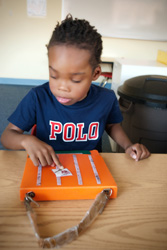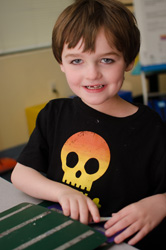Helping Children Develop Communication and Play Skills
 We understand how important it is to be able to communicate with your child. Communication and social pragmatic language are two areas of difficulty for children with autism. Speech-language pathologists at The Shafer Center for Early Intervention use a variety of methods to address these skills including:
We understand how important it is to be able to communicate with your child. Communication and social pragmatic language are two areas of difficulty for children with autism. Speech-language pathologists at The Shafer Center for Early Intervention use a variety of methods to address these skills including:
- Social stories
- Language scripts
- Social thinking strategies
- Following your child’s lead during play
- Augmentative and alternative communication devices (AAC)
- Literature
- Therapeutic play techniques
In addition to language difficulties, children with autism also often have motor speech disorders (dyspraxia). Our speech-language pathologists use evidence-based techniques (such as PROMPT) to facilitate speech production and to improve your child’s communication skills.
Individual Therapy
If your child needs individual attention, our speech-language therapy (SLP) services are available for children ages 18 month to 10 years old in half-hour or one-hour sessions, and can be conducted at our location or in your home. Our speech-language pathologists will work with your child individually to improve his/her communication skills in a positive and fun learning environment.
 Small-Group Therapy
Small-Group Therapy
At The Shafer Center for Early Intervention, we have resources to meet a diverse range of needs for children ages 2 to 10. Small-group treatment engages children in guided play experiences with peers to develop expressive, receptive, and social-pragmatic language skills. Your child will receive individualized goals and objectives that will be targeted in a small group setting. He/she will be matched to groups based on skill level and age. Each one-hour session consists of 2-4 children per group.
Speech-Language Consultation
Speech-language consultations are available at The Shafer Center for Early Intervention or in your home, as well as at your child’s school, day care or equivalent. Consultations are an excellent opportunity for a speech-language pathologist to observe and offer individualized feedback and recommendations to support your child’s language skill development in various settings. Parent, teacher, caregiver, and one-on-one aide trainings and support are also available.